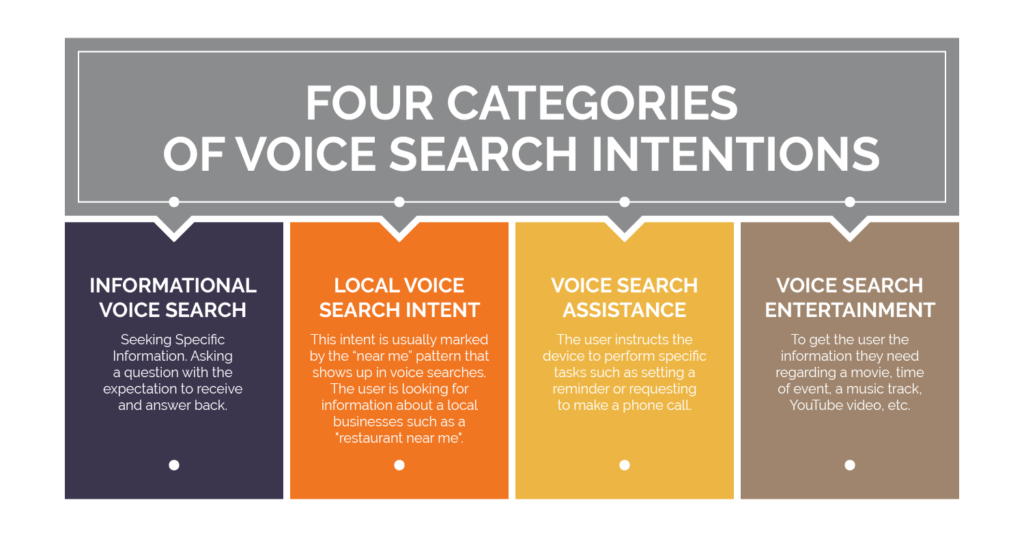
For companies trying to improve their online presence, staying ahead of the curve in the ever changing field of digital marketing is essential. Voice Search Optimization in SEO is one such area that has grown in popularity recently. It is now essential to optimize your website for voice search as voice-enabled gadgets and virtual assistants become more common. We’ll go into what voice search optimization is in this article and why it’s so important for companies to follow this trend.
What is Voice Search Optimization?

Voice Search Optimization is the process of tailoring your website’s content and structure to align with the way people naturally speak when using voice-enabled devices such as smartphones, smart speakers, or virtual assistants like Siri, Google Assistant, and Alexa. Unlike traditional text-based searches, voice queries tend to be more conversational and often mimic real-life conversations.
Voice search optimization refers to the process of optimizing digital content to enhance its visibility and relevance for voice-based queries made through voice-enabled devices or virtual assistants. Here’s a description in points:
- Speech Recognition Technology:
- Voice search optimization focuses on adapting content for speech recognition technology used in devices like smartphones, smart speakers, and virtual assistants.
- Natural Language Processing (NLP):
- Natural Language Processing is crucial in voice search optimization, as it helps search engines understand and interpret the natural language queries spoken by users.
- Keyword Research for Voice Queries:
- Unlike traditional text-based searches, voice queries are often longer and more conversational. Optimization involves researching and incorporating relevant long-tail keywords that match typical spoken phrases.
- Local SEO Emphasis:
- Many voice searches are location-specific. Optimizing for local SEO ensures that businesses can appear in voice search results when users seek nearby products or services.
- Structured Data Markup:
- Implementing structured data markup, such as Schema.org, helps search engines better comprehend the content and context of a webpage, aiding in more accurate voice search results.
- Mobile Optimization:
- Since a significant portion of voice searches occurs on mobile devices, ensuring mobile-friendly websites is essential for a seamless user experience.
- Featured Snippets and Position Zero:
- Voice assistants often pull information from featured snippets or the “position zero” on search engine results pages. Optimizing content for these snippets increases the chances of being selected for voice responses.
- Conversational Content Creation:
- Content should be created in a conversational tone to align with the way people speak. This includes FAQs, colloquial language, and addressing common questions users might ask.
- Page Load Speed:
- Quick-loading pages are crucial for voice search optimization, as users expect instant responses. Optimization should focus on reducing page load times for a better user experience.
- User Intent Understanding:
- Voice search optimization involves understanding user intent behind voice queries and tailoring content to meet those specific needs effectively.
- Continuous Monitoring and Adaptation:
- Given the dynamic nature of search algorithms and user behavior, ongoing monitoring and adaptation of voice search optimization strategies are necessary for maintaining relevance and effectiveness.
- Cross-Device Compatibility:
- Considering that voice searches can occur across various devices, ensuring compatibility and optimization for different platforms contribute to a comprehensive voice search strategy.
By implementing these strategies, businesses and content creators can enhance their online presence and visibility in the growing landscape of voice-activated search.
Why Optimize Your Website for Voice Search And It’s Benefits?

Changing User Behavior
Because voice search is so convenient, users’ interactions with search engines have changed. These days, people are more likely to ask inquiries out loud in normal language and want precise answers right away. By making your website voice search engine friendly, you can make sure that the information on your website answers these conversational questions, improving user experience and raising the possibility that your website will show up in relevant voice search results.
Rising Adoption of Voice-Enabled Devices
Voice search has becoming more popular as smart speakers, smartphones, and other voice-activated devices proliferate. Businesses must modify their SEO strategy to account for this change in search behavior as more users incorporate these gadgets into their everyday lives. You may position your website to reach a wider audience and satisfy the needs of tech-savvy customers by optimizing for voice search.
Local Search and Mobile Optimization
Local intent is frequently strongly correlated with voice searches. People usually seek for location-specific information, such what restaurants, shops, or services are nearby. Incorporating local SEO tactics into your website optimization for voice search is necessary to make sure that your company can be found in location-based searches. Further improving the user experience is optimizing for voice search, which naturally coincides with mobile optimization since many voice searches are conducted on mobile devices.
Improving SEO Rankings
Google and other search engines give preference to websites that respond to user inquiries in a clear, succinct, and authoritative manner. In order to optimize your voice search results, you must provide conversational content that also answers frequently asked questions in your sector. By doing this, you raise the possibility that a voice search result may include your website, which will raise your SEO ranks and bring in more organic visitors.
Conclusion
Voice search optimization is now a reality that businesses cannot afford to ignore; it is no longer just a futuristic idea. Maintaining business competitiveness in the digital space requires you to modify your SEO approach to take advantage of voice search trends. In addition to improving user experience, voice search optimization puts your company in a strong position to prosper in the voice-activated future. Keep up with the times and make your website visible in the voice search space.
You Must Also Read:
- 10 Off-Page SEO Strategies of 2024 Which Elevate Your Keyword Rankings
- A Comprehensive Strategy Of On-Page SEO For Keyword Ranking In 2024
- Understanding On-Page SEO: A Comprehensive Guide
- What Are Backlinks And Keywords? Why Are They Important for SEO?
- What is Guest Posting? | How to Outreach For a Guest Post From Mail
- Guide To SXO: Elevating SEO Through Enhanced User Experience
- Introduction to SEO: Unveiling the Web’s Secret Sauce ( Search Engine Optimization )
- Digital Marketing Simplified: Understanding the Basics and Current Trends
- Unveiling the Power of Technical SEO And Best Practices for Technical SEO 2024
- Top 10 Most SEO Latest Content Trends To Optimize in 2024
- Best Email Marketing Tips for Success
